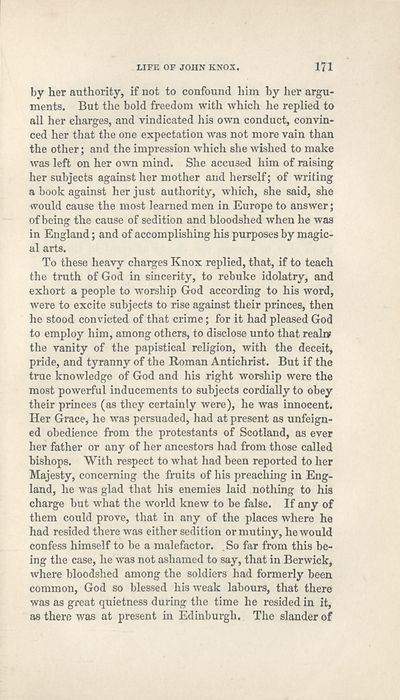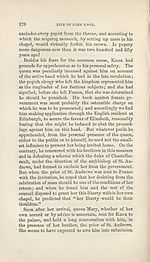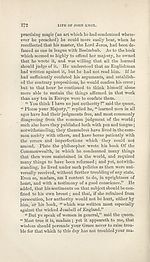Download files
Complete book:
Individual page:
Thumbnail gallery: Grid view | List view

LIFE OF JOHN KNOX.
m
by her authority, if not to confound him by her argu¬
ments. But the hold freedom with which he replied to
all her charges, and vindicated his own conduct, convin¬
ced her that the one expectation was not more vain than
the other; and the impression which she wished to make
was left on her own mind. She accused him of raising
her subjects against her mother and herself; of writing
a book against her just authority, which, she said, she
would cause the most learned men in Europe to answer;
of being the cause of sedition and bloodshed when he was
in England; and of accomplishing his purposes by magic¬
al arts.
To these heavy charges Knox replied, that, if to teach
the truth of God in sincerity, to rebuke idolatry, and
exhort a people to worship God according to his word,
were to excite subjects to rise against their princes, then
he stood convicted of that crime; for it had pleased God
to employ him, among others, to disclose unto that realw
the vanity of the papistical religion, with the deceit,
pride, and tyranny of the Roman Antichrist. But if the
true knowledge of God and his right worship were the
most powerful inducements to subjects cordially to obey
their princes (as they certainly were), he was innocent.
Her Grace, he was persuaded, had at present as unfeign¬
ed obedience from the protestants of Scotland, as ever
her father or any of her ancestors had from those called
bishops. With respect to what had been reported to her
Majesty, concerning the fruits of his preaching in Eng¬
land, he was glad that his enemies laid nothing to his
charge but what the world knew to he false. If any of
them could prove, that in any of the places where he
had resided there was either sedition or mutiny, he would
confess himself to he a malefactor. So far from this be¬
ing the case, he was not ashamed to say, that in Berwick,
where bloodshed among the soldiers had formerly been
common, God so blessed his weak labours, that there
was as great quietness during the time he resided in it,
as there was at present in Edinburgh. The slander of
m
by her authority, if not to confound him by her argu¬
ments. But the hold freedom with which he replied to
all her charges, and vindicated his own conduct, convin¬
ced her that the one expectation was not more vain than
the other; and the impression which she wished to make
was left on her own mind. She accused him of raising
her subjects against her mother and herself; of writing
a book against her just authority, which, she said, she
would cause the most learned men in Europe to answer;
of being the cause of sedition and bloodshed when he was
in England; and of accomplishing his purposes by magic¬
al arts.
To these heavy charges Knox replied, that, if to teach
the truth of God in sincerity, to rebuke idolatry, and
exhort a people to worship God according to his word,
were to excite subjects to rise against their princes, then
he stood convicted of that crime; for it had pleased God
to employ him, among others, to disclose unto that realw
the vanity of the papistical religion, with the deceit,
pride, and tyranny of the Roman Antichrist. But if the
true knowledge of God and his right worship were the
most powerful inducements to subjects cordially to obey
their princes (as they certainly were), he was innocent.
Her Grace, he was persuaded, had at present as unfeign¬
ed obedience from the protestants of Scotland, as ever
her father or any of her ancestors had from those called
bishops. With respect to what had been reported to her
Majesty, concerning the fruits of his preaching in Eng¬
land, he was glad that his enemies laid nothing to his
charge but what the world knew to he false. If any of
them could prove, that in any of the places where he
had resided there was either sedition or mutiny, he would
confess himself to he a malefactor. So far from this be¬
ing the case, he was not ashamed to say, that in Berwick,
where bloodshed among the soldiers had formerly been
common, God so blessed his weak labours, that there
was as great quietness during the time he resided in it,
as there was at present in Edinburgh. The slander of
Set display mode to:
![]() Universal Viewer |
Universal Viewer | ![]() Mirador |
Large image | Transcription
Mirador |
Large image | Transcription
| Antiquarian books of Scotland > Scotland/Scots > Life of John Knox ; and, The life of Alexander Henderson > (189) |
|---|
| Permanent URL | https://digital.nls.uk/131834572 |
|---|
| Description | Thousands of printed books from the Antiquarian Books of Scotland collection which dates from 1641 to the 1980s. The collection consists of 14,800 books which were published in Scotland or have a Scottish connection, e.g. through the author, printer or owner. Subjects covered include sport, education, diseases, adventure, occupations, Jacobites, politics and religion. Among the 29 languages represented are English, Gaelic, Italian, French, Russian and Swedish. |
|---|

